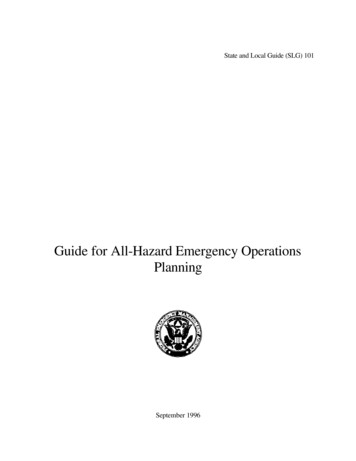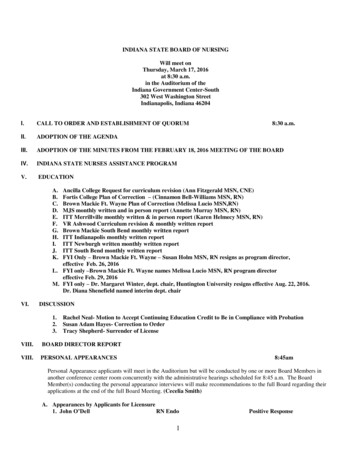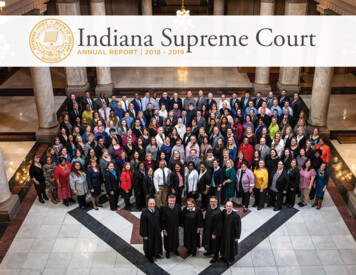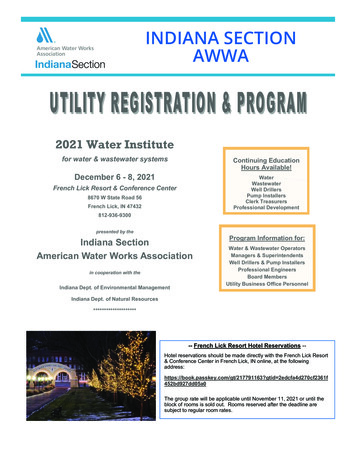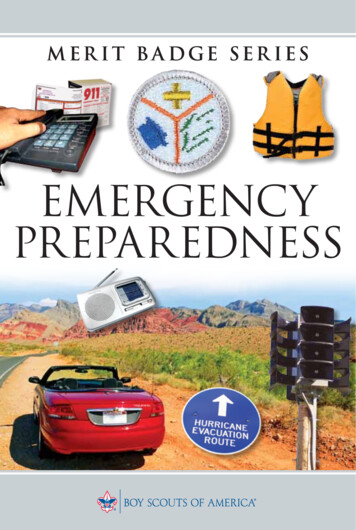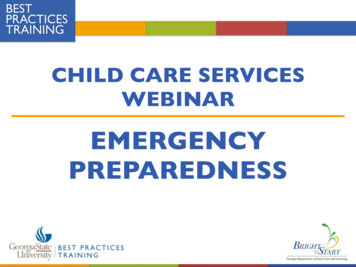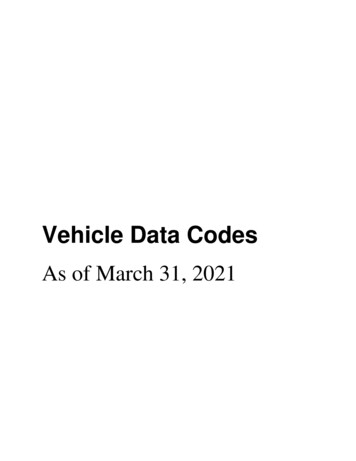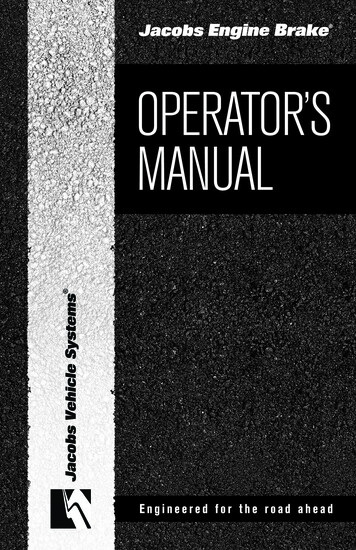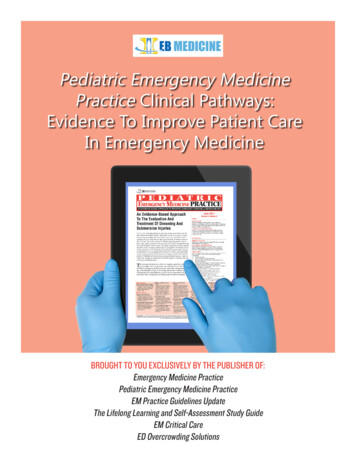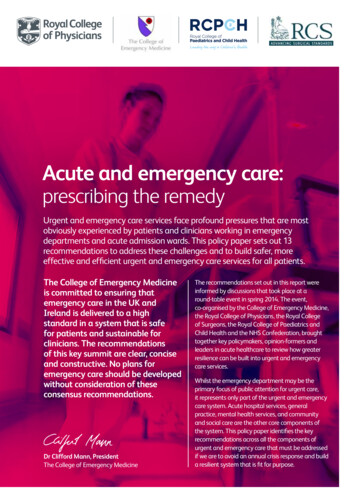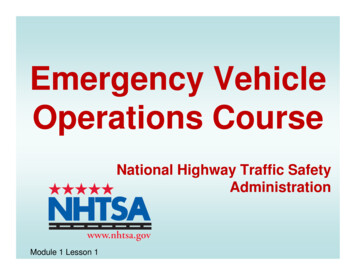
Transcription
Emergency VehicleOperations CourseNational Highway Traffic SafetyAdministrationModule 1 Lesson 1
The following presentationwas developed by thefollowing:
The following presentationwas developed by thefollowing:Special ThanksLt. Justin HivelyLt. Daniel LewisLt. Stephen L. Garrison
EVOCEVOC is a Indiana State Certified courseadhering to National Highway TransportationSafety Administration and state standards.Departmental Policy may vary from thematerial covered in this course. Pleasefollow your department’s policy when thereis discrepancy.
Professional Vehicle OperatorDo driving habitsportray aprofessionalimage? Just like appearance, driving habitsreflect professionalism Is SAFETY highest on the driver’s prioritylist?
Professional Vehicle OperatorDriving Unprofessionally: Costs Money Inhibits employees fromgetting as nice a raise, anew ambulance, or thatnew piece of equipment Just does not make anysense these days
Two for SafetyWe are all in this together: Support each otherONE CAR NOTSTOPPING Spot each other Communicate witheach other Hold each otheraccountableTwo blocks up thena left, correct?
EVOC is: Designed to review critical concepts ofemergency driving A State certified Emergency VehicleOperations Course that is based on theNational Highway Transportation SafetyAdministration [NHTSA] curriculum Made of 3 distinct components
OverviewThree distinct components– On-line/Classroom Education Nine modules to complete before the driving course– Emergency Driving Course Practical hands on program that will be deliveredby the Training and Education staff– Written Examination Based on the nine on-line modules
Overview Participants successfully completing theprogram will be awarded16 hours ofcontinuing education Paramedics can apply these hours to the“Additional Hours” category
Overview Maintaining the Indiana State EVOCcertification requires three hours ofcontinuing education on EmergencyVehicle Operation each year Hours can be acquired via EVOCrefresher courses or eLearning lessons
EVOC Teaches:– Legal aspects of ambulance operation Federal State Local– Legal definitions: Due regard, true emergencies, negligence,abandonment, good samaritan provisions,patient’s rights
EVOC Teaches:– Communication responsibilities Sending and receiving radio messages Interpreting hand signals– Ambulance types General guidelines for each Weight restrictions Operation for each type– Ambulance readiness Inspection Maintenance Repair
EVOC Teaches:– Navigation and route planning– Normal and high risk driving situations– Appropriate driving skills for situations Routine traffic Hazardous weather Hazardous traffic conditions– Safety considerations PassengersPatients/familyAmbulanceCrew
Who takes EVOC? Firefighters designatedas Driver/Operators Not required for allFirefighters Most EMS Professionals Police Agencies
PracticeEVOC provides time topractice and learn in acontrolled environment
LESSON ONEINTRODUCTION TO THE NATIONAL STANDARD CURRICULUM FOR AMBULANCEOPERATORSLesson Goal:In this lesson you will be introduced to theEmergency Vehicle Operator Course (EVOC) bydescribing its organization and schedule and reviewingcourse materials.
ObjectivesAt the Completion of Lesson 1, each participantwill be able to:–––––Identify ambulance operator selection requirements.Identify the purpose of this course.Identify who this course is designed to assist.Summarize the organization of this course.Identify the three (3) areas that are needed tosuccessfully complete this course.– Indicate the pre-employment and employmentqualifications necessary for an ambulance operator.– Recognize the importance of physical and mentalfitness, as well as personal hygiene, as it relates toambulance operations.
The rules according to NHTSANATIONAL STANDARDS
National Standards Authorization of ambulance operationsmust always be based on Bona FideOccupational Qualifications for the task ofambulance operations. Qualifications should not be arbitrary, but based ontrue needs
National Standards Bona Fide Occupational QualificationDefined– Employment based on a qualification, thatwould otherwise be considered discrimination,due to certain attributes being needed toperform assigned tasks the job would entail.Such as a certain age requirement, butcannot include race or color as a requirement.
National StandardsRecommended pre-employment testingincludes:– Driver/license checks– Medical checks– Driving knowledgeand performanceevaluation
National StandardsDriving checks– Driving record checksand license checksshould be preconditionsto hiring or acceptanceinto an EMSorganization.
National StandardsState motor vehicle record check– The previous three years should bereviewed for: SpeedingCareless/reckless drivingDriving under the influenceMoving violations
Why a BMV Record Check?Driving reflects your personal habits. Ifone drives fast off duty, they will mostassuredly drive fast on duty. That is acrash waiting to happen.
National StandardsMVC checks– Driving record shouldbe checked for anyaccidents within the lastfive years.– It all paints a pictureabout how you drive
A little Birdie said it might be important toremember that driving recordchecks go back 3 years andaccident checks go back 5years.
National StandardsLicense check– Your license should bechecked to assure validityand to assure you arequalified for the type ofvehicle you will beoperating. No ambulance operator shalloperate an ambulance withan expired operators license
National StandardsMedical check– Should be assessed by a licensed physician– Should reveal no medical or physicalconditions that would prevent safe andeffective operation of an ambulance including: Loss of consciousness, cardiovascular disease,neurological/neurovascular disorder, mental illness,substance abuse/dependency, insulin-dependent diabetes,musculoskeletal disorders that would prevent operating anambulance
National Standards Driving knowledge and performance– Pass the post EVOC written test– Pass a hands-on driving test– Pass an on-the-job real life performanceprobationary period Participants meeting these standards willbe considered qualified ambulanceoperators
Physical Fitness Affected by health & amountof rest you are getting The flu may cause you to beless alert and not perform atyour best Upper extremity injuries mayaffect ability to maneuver thevehicle
Physical Fitness Over the counter medicationsmay make you sleepy Sleep deprivation may makeyour response time slower
National Standards Having a good attitude is the best influenceon doing a good job.Most people willdo the right thingif allowed the timeto do it
National StandardsMental fitness– May be affected by lack ofconcentration or use ofalcohol and/or drugs– When worried aboutoutside factors you may bedistracted and should notdrive until you are betterable to concentrate
National StandardsMental fitness– When distracted by angeryou may take risks younormally wouldn’t. Calm down before driving.– Do not drink or use anyform of illicit drug anddrive on or off duty
National StandardsPersonal hygiene and appearance– Both have a lot to do with how wellyou perform your job– Professional physical appearancebuilds confidence in patients andother civilians that you might needto direct
National StandardsPersonal hygiene and appearance– Personal hygiene is essential to prevent thespread of disease– Appearance applies not only to self but toequipment as well.– Properly cleaned and stowed equipmentmakes operating an ambulance safer for thecrew and the patient.
National StandardsParticipate in training– After completing thiscourse the most importanttask is to improve drivingskills at every opportunity– This is often the beginningof several years of training
INDIANA LAW
Indiana LawIC 9-24-1-4Medical service vehicle operation; requirementsSec. 4.Except as provided in section 7 of this chapter, anindividual must:(1) have a valid Indiana operator's, chauffeur's,or public passenger chauffeur's license; and(2) be at least eighteen (18) years of age todrive a medical services vehicle upon anIndiana highway.As added by P.L.2-1991, SEC.12.
Indiana Law140 lAC 7-3-16 Exemptions Commercial Drivers LicenseAuthority: IC 9-14-2-2; IC 9-24-6-2Affected: IC 9-24-6-1Sec. 16. The provisions of this rule do not apply to the following:1.Non civilian members of the armed forces or NationalGuard while operating military vehicles.2.Civilians who are required to wear military uniforms and aresubject to the code of military justice.3.Paid or volunteer firefighters while operating fire fightingequipment.
Indiana Law140 lAC 7-3-16 Exemptions Commercial Drivers LicenseAuthority: IC 9-14-2-2; IC 9-24-6-2Affected: IC 9-24-6-14. Persons who operate farm vehicles which are:a. controlled and operated by a person actively engaged infarming;b. used to transport agricultural products, farm machinery,or farm supplies to and from a farm;c. not used as common or contract motor carriers; andd. used within 150 miles of the person's farm.
Indiana Law5.Persons who operate vehicles which are:a. registered as a recreational vehicle; andb. used primarily to transport the owner's family members orguests and their possessions for non business purposes.
SUMMARY
Summary Ambulance operators areselected based on theirqualifications to perform theduties required of them. A driving record check andlicense check is aprecondition to hiring.
Summary A medical evaluation should berequired to determine physicalability to perform the job underall conditions. You should pass thisambulance operator coursewritten test and driving test,then pass the on-the-jobdriving evaluation.
Summary You are expected to bementally and physically fitfor every run. Your personal appearanceand hygiene have a lot todo with how well youperform your job.
Questions?
– Identify the purpose of this course. – Identify who this course is designed to assist. – Summarize the organization of this course. – Identify the three (3) areas that are needed to successfully complete this course. – Indicate the pre-employment and emplo
